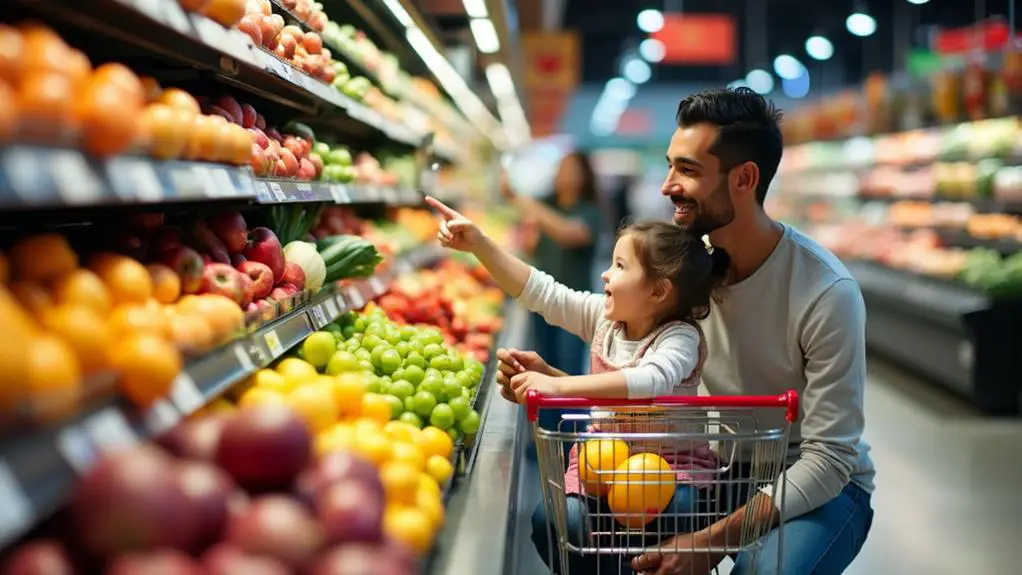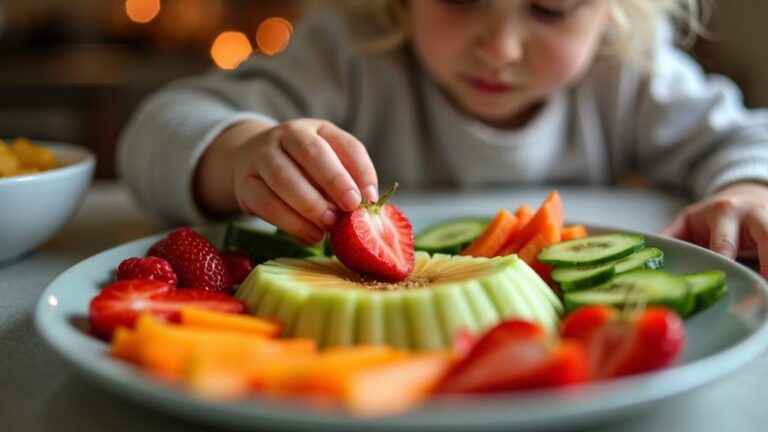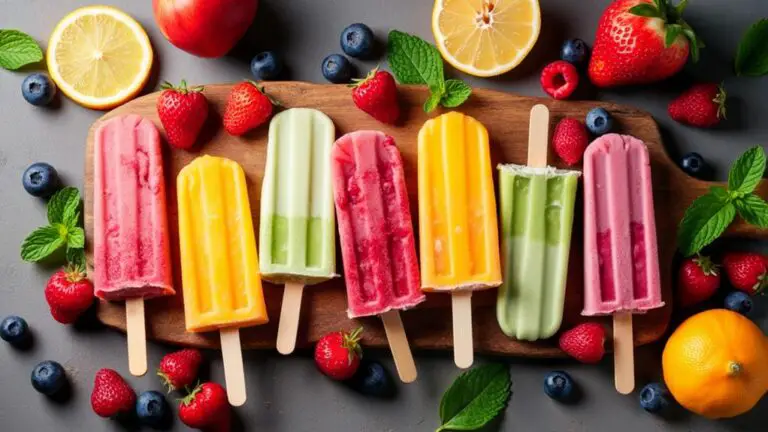Making Grocery Shopping a Learning Experience for Kids
Transform grocery shopping into an educational adventure for your kids. Involve them in meal planning, create picture-based shopping lists, and teach budgeting skills. At the store, let them weigh produce, count items, and play "I Spy" to boost numeracy and literacy. Encourage label reading and price comparisons to develop decision-making abilities. Set clear ground rules and use a "shopping buddy" system to manage behavior. These trips can foster financial literacy, nutrition awareness, and strengthen your parent-child bond. By turning errands into learning opportunities, you'll help your children develop essential life skills that extend far beyond the grocery aisles.
Key Takeaways
- Involve children in meal planning and creating shopping lists to enhance literacy and organization skills.
- Engage kids in counting, weighing produce, and comparing prices to reinforce math concepts.
- Play educational games like "I Spy" to boost observation skills and vocabulary while shopping.
- Teach financial literacy by discussing budgets and distinguishing between needs and wants.
- Encourage reading food labels to promote comprehension and nutrition awareness.
Planning for Educational Shopping
Grocery shopping's educational potential can be maximized with thoughtful planning. Start by involving your children in meal planning discussions, exploring various cuisines and selecting recipes together. This approach enhances their understanding of healthy eating and expands their culinary knowledge.
Create a shopping list using pictures or words, allowing younger kids to practice literacy skills while older ones engage in writing and organization. Teach budgeting by discussing item costs and involving older children in price comparisons, helping them prioritize needs versus wants.
For weekly meal planning with older kids, use a dry-erase board to visually track needed items and reinforce organization concepts. Schedule your grocery store visits during less crowded times to guarantee a relaxed environment, making it easier for children to engage in this learning experience without overwhelming distractions.
These life skills will serve them well in the future.
In-Store Learning Activities
Once inside the store, you'll find numerous opportunities to turn shopping into an educational adventure for your kids.
Let them weigh produce, teaching them about measurements and basic physics. Encourage counting as you add items to the cart, reinforcing numerical skills in a real-world context.
While searching for items on the list, play "I Spy" to boost observation skills and vocabulary. Have your children identify colors, shapes, and letters on product packaging to enhance early literacy development.
Involve them in reading food labels, promoting comprehension and nutrition awareness. As you shop, create a game of finding and trying new foods to expand their palates and knowledge.
Developing Essential Life Skills
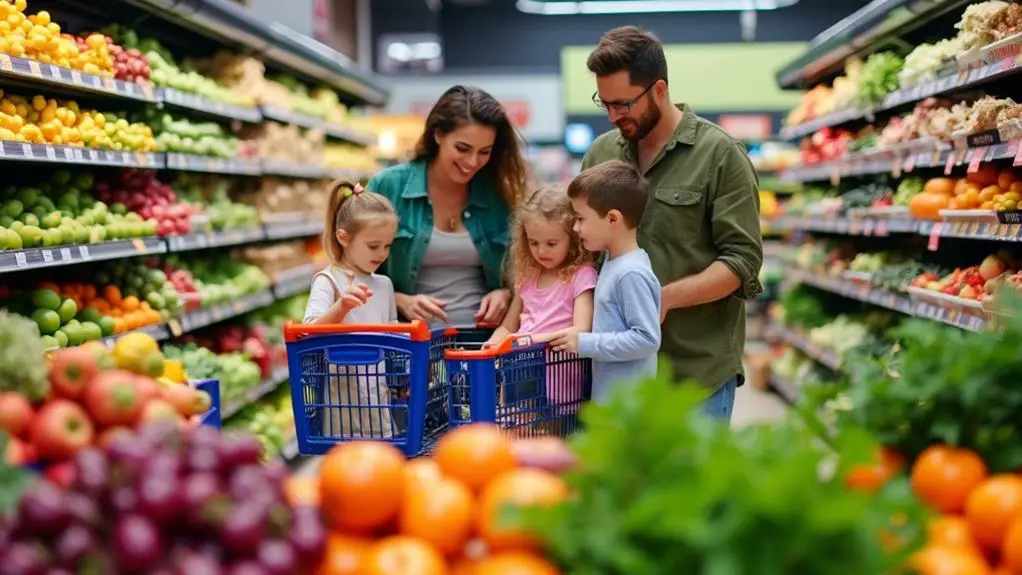
A treasure trove of life skills awaits your children during grocery shopping trips. You'll help them develop financial literacy as they learn to distinguish needs from wants and manage a budget. They'll enhance their decision-making abilities by evaluating choices based on price, nutrition, and preferences. Math skills get a boost through counting, adding prices, and calculating discounts. Grocery store visits also foster responsibility and independence as kids take on tasks like carrying the list or selecting items.
| Life Skill | Shopping Activity | Benefit |
|---|---|---|
| Financial Literacy | Budget management | Needs vs. wants distinction |
| Decision Making | Product evaluation | Informed choices |
| Math Skills | Price calculations | Practical arithmetic |
| Responsibility | Task completion | Independence and contribution |
| Social Skills | Interaction with store staff | Communication and manners |
These essential life skills will serve your children well beyond the grocery store, preparing them for future challenges and opportunities.
Managing Behavior While Shopping
Successful grocery shopping with kids hinges on effective behavior management.
To guarantee a smooth trip, set clear ground rules before entering grocery stores. Engage your children in discussions about the shopping list and their roles, fostering a sense of responsibility. Implement a "shopping buddy" system to promote cooperation and minimize distractions.
To encourage good behavior and positive engagement with new foods, consider:
- Setting expectations for staying close and only touching items being added to the cart
- Utilizing praise and rewards for good behavior during shopping
- Engaging children in brief discussions about the shopping list
- Preparing for potential meltdowns with calming items or snacks
Long-Term Benefits of Grocery Trips
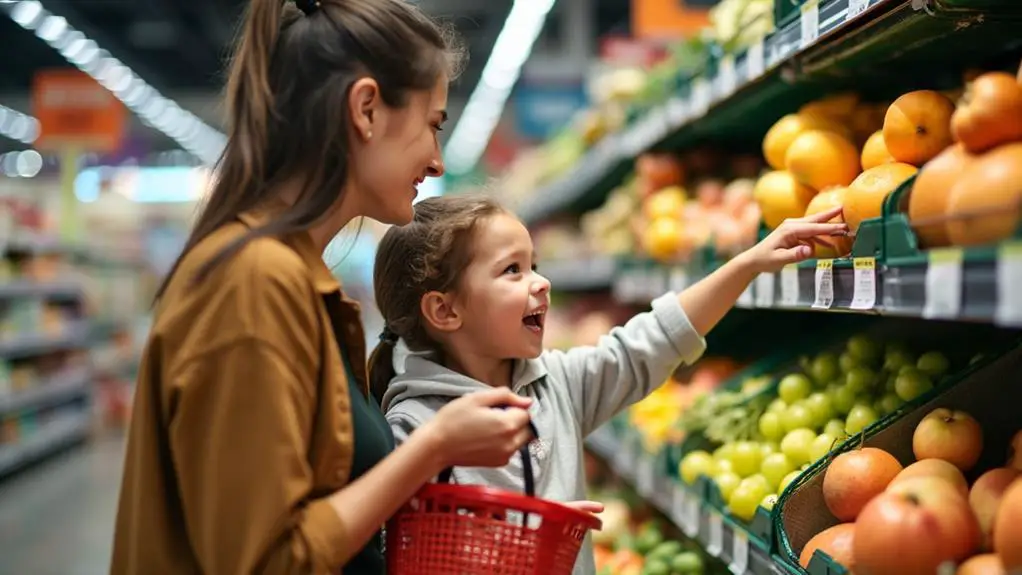
Regular grocery trips with your children offer numerous long-term benefits that extend far beyond the immediate task of filling your pantry.
You'll help them develop essential math skills, like addition and budgeting, which are vital for future financial literacy. These shopping trips also foster a lifelong interest in nutrition, teaching kids about different food groups and making healthier choices.
Don't feel overwhelmed; each trip to the grocery store is an opportunity to strengthen your parent-child bond and promote open communication. The skills they acquire, such as decision-making and responsibility, will transfer to other areas of life, boosting their independence and confidence.
Over time, these outings can evolve into a cherished family tradition, contributing to your child's overall development and social skills. Make sure to engage them consistently to reap these long-term benefits.
Conclusion
By turning grocery trips into learning adventures, you're planting seeds of knowledge that'll bloom throughout your child's life. You'll cultivate math skills, nutrition awareness, and decision-making abilities while guiding through the aisles together. As you embrace these teachable moments, you're not just filling your cart but also filling your child's mind with valuable lessons. So push that cart forward, knowing you're steering your little one towards a future of informed choices and independence.

